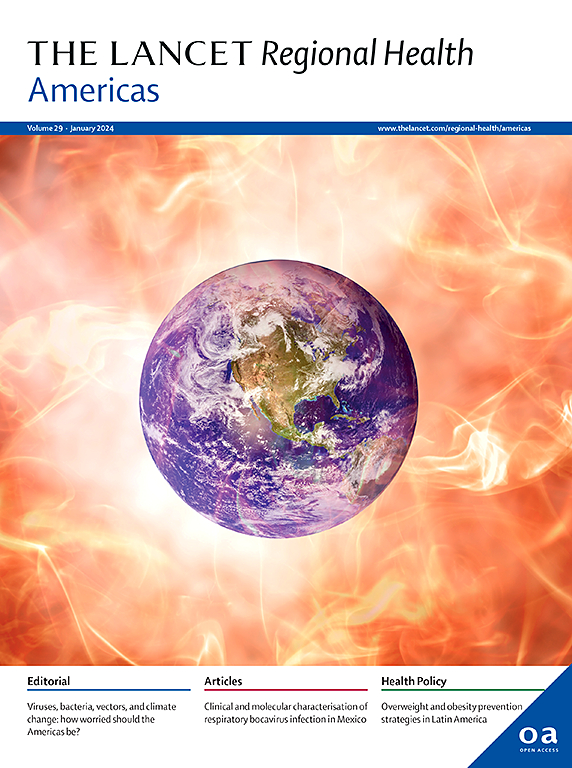Prevalence and correlates of severe depressive symptoms among Arab, Asian, Black, Indigenous, White, and mixed-race individuals in Canada: a population-based study
IF 7
Q1 HEALTH CARE SCIENCES & SERVICES
引用次数: 0
Abstract
Background
Canada's mental health crisis has worsened since the COVID-19 pandemic. Depression is particularly concerning due to its prevalence and significant effects, but racial differences in its occurrence and associated factors remain underexplored. This cross-sectional study aims to address this gap by (1) assessing the prevalence of depressive symptoms among Arab, Asian, Black, Indigenous, White, and mixed-race individuals in Canada, and (2) identifying the factors associated within these racial groups.
Methods
A nationally representative sample (N = 4220) was randomly selected from a Computer-Assisted Web Interviewing panel, ensuring racial diversity (45.45% White, 13.53% Black, 13.25% Indigenous, 11.30% Arab, 7.32% Asian). Multiple linear and logistic regression analyses examined the associations between racial discrimination, resilience, and depression, controlling for sociodemographic factors.
Findings
The prevalence of depressive and severe depressive symptoms varied significantly across racial groups: Indigenous (49.37% and 21.11%), Arab (44.23% and 17.19%), Asian (41.42% and 13.92%), Black (32.92% and 12.78%), and White (32.69% and 10.53%), χ2 (6) = 88.41, p < 0.0001 and χ2 (6) = 65.16, p < 0.0001. For depressive symptoms, gender differences were significant only among White (28.96% men, 35.37% women, χ2 (1) = 8.92, p = 0.0028) and Indigenous (41.40% men, 54.14% women) participants, χ2 (1) = 8.54, p = 0.0035 and only for Indigenous participants for severe depressive symptoms. Younger participants consistently reported higher depressive and severe depressive symptoms rates across all racial groups. Everyday racial discrimination was significantly associated with depressive symptoms among all racialized and Indigenous groups (β = 0.28–0.43, p < 0.0001). Those reporting very high levels of discrimination were 4.79–18.61 times more likely to exhibit clinically significant depressive symptoms compared to those with low discrimination (Adjusted Odds Ratio = 4.79–18.61, p < 0.0001) with similar patterns for severe depressive symptoms. Resilience was negatively associated with depressive symptoms across all groups.
Interpretation
This study highlights the ongoing mental health crisis in Canada, particularly among racialized and Indigenous communities, which has been exacerbated by the complex racial trauma related to the experience of racial discrimination. There is a critical need for a national mental health plan that incorporates anti-racist and culturally sensitive prevention and care to ensure equitable access to mental health services.
Funding
This study was funded by a grant from the Public Health Agency of Canada (PHAC – grant # 2324-HQ-000162).
加拿大阿拉伯人、亚洲人、黑人、土著、白人和混血儿中严重抑郁症状的患病率及其相关因素:一项基于人群的研究
自2019冠状病毒病大流行以来,加拿大的心理健康危机恶化。由于其普遍性和显著的影响,抑郁症尤其令人担忧,但其发生的种族差异和相关因素仍未得到充分研究。本横断面研究旨在通过(1)评估加拿大阿拉伯人、亚洲人、黑人、土著、白人和混血儿个体中抑郁症状的患病率,以及(2)确定这些种族群体中的相关因素来解决这一差距。方法采用计算机辅助网络访谈法,随机抽取全国代表性样本4220例,确保种族多样性(白人45.45%,黑人13.53%,土著13.25%,阿拉伯11.30%,亚洲7.32%)。多元线性和逻辑回归分析检验了种族歧视、心理弹性和抑郁之间的关系,控制了社会人口因素。结果不同种族人群的抑郁和重度抑郁症状患病率差异显著:原住民(49.37%和21.11%)、阿拉伯人(44.23%和17.19%)、亚洲人(41.42%和13.92%)、黑人(32.92%和12.78%)和白人(32.69%和10.53%),χ2 (6) = 88.41, p < 0.0001, χ2 (6) = 65.16, p < 0.0001。对于抑郁症状,性别差异仅在白人(男性28.96%,女性35.37%,χ2 (1) = 8.92, p = 0.0028)和土著(男性41.40%,女性54.14%,χ2 (1) = 8.54, p = 0.0035)受试者中存在显著性差异,且仅在土著受试者中存在严重抑郁症状。在所有种族群体中,年轻的参与者一致报告抑郁和严重抑郁症状的发生率较高。在所有种族化和土著群体中,日常种族歧视与抑郁症状显著相关(β = 0.28-0.43, p < 0.0001)。那些报告高度歧视的人表现出临床显著抑郁症状的可能性是那些报告低歧视的人的4.79-18.61倍(调整优势比= 4.79-18.61,p < 0.0001),严重抑郁症状的模式相似。在所有组中,恢复力与抑郁症状呈负相关。本研究强调了加拿大持续存在的心理健康危机,特别是在种族化和土著社区中,这种危机因与种族歧视经历相关的复杂种族创伤而加剧。迫切需要制定一项国家心理健康计划,将反种族主义和对文化敏感的预防和护理纳入其中,以确保公平获得心理健康服务。本研究由加拿大公共卫生署拨款(PHAC - grant # 2324-HQ-000162)资助。
本文章由计算机程序翻译,如有差异,请以英文原文为准。
求助全文
约1分钟内获得全文
求助全文
来源期刊

Lancet Regional Health-Americas
Multiple-
CiteScore
8.00
自引率
0.00%
发文量
0
期刊介绍:
The Lancet Regional Health – Americas, an open-access journal, contributes to The Lancet's global initiative by focusing on health-care quality and access in the Americas. It aims to advance clinical practice and health policy in the region, promoting better health outcomes. The journal publishes high-quality original research advocating change or shedding light on clinical practice and health policy. It welcomes submissions on various regional health topics, including infectious diseases, non-communicable diseases, child and adolescent health, maternal and reproductive health, emergency care, health policy, and health equity.
 求助内容:
求助内容: 应助结果提醒方式:
应助结果提醒方式:


